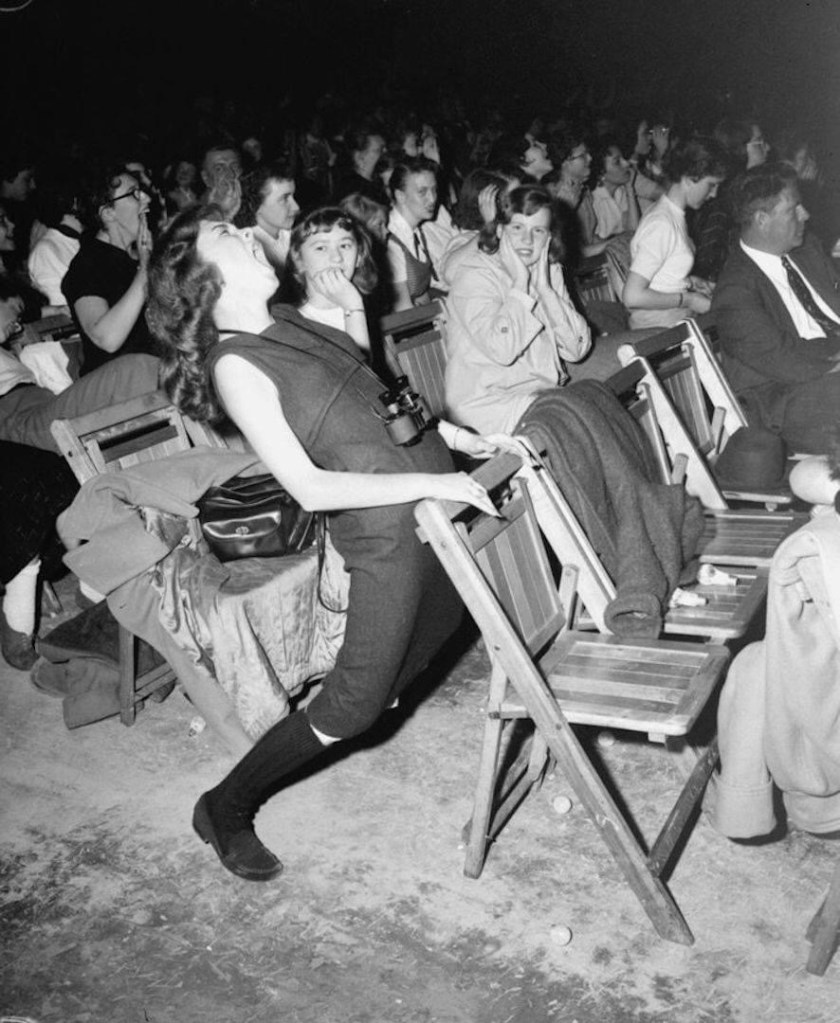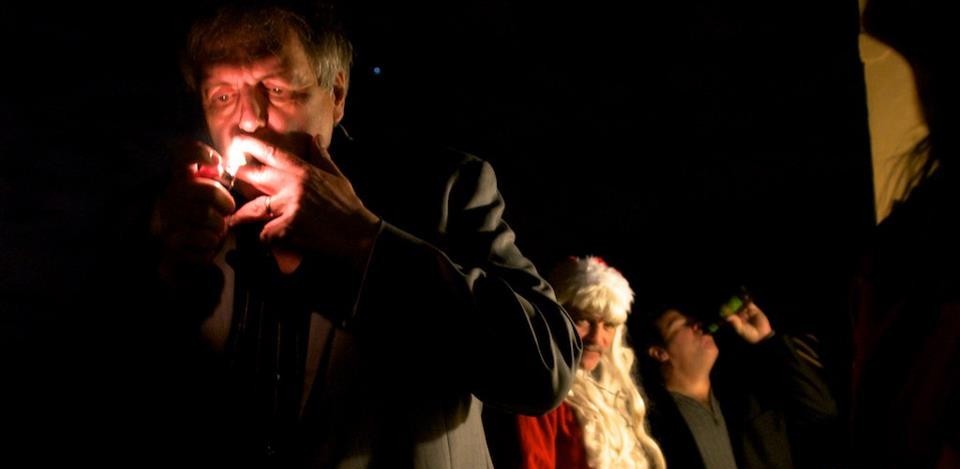One of my very favorite moments from The Last Waltz, with Robbie Robertson and Eric Clapton out front with The Band on Clapton’s live standby Further On Up The Road. Clapton’s in fine form but far too polite an Englishman to engage in a tawdry North American style cutting contest, but Robbie, raised in gritty roadhouses on both sides of the border, doesn’t know any other way and goes for the jugular, blood all over the floor by the time he finishes. Eric grins a surrender and follows up with a fine solo but never tries to outdo Robbie, whose show it is afterall. Rock’n’roll can be so polite. In real jazz and old R&B it could have been Robertson’s deathbed solo and the other cat would have tried to bury him anyway, no mercy, no quarter. I always thought it a shame that Clapton didn’t come back with a solo to make this a cutting contest to the death, back and forth, each of them throwing everything they had into topping the other motherfucker’s solo till, exhausted, one or the other gave in, humiliated. I’ve watched saxophone players do that and you can see the moment one of them, laughing and vanquished, gives in. It’s macho to the core. Exhilarating. But Eric was a nice guy, and it was a bittersweet event in a San Francisco hall full of faded peace and love hippies and he let Robbie have this one in a classic Robbie Robertson explosion of rockabilly and blues licks.
Category Archives: Roots
Rock’n’roll
In 1957 a Philadelphia teenager in black top, black jeans and black boots howls like a wild animal at an Elvis Presley concert. Rock’n’roll had been unleashed. Elvis did a few quick tours that year and they were apparently frenzied affairs, Elvis and his band getting down, the audiences getting crazy. In one city the audience stormed the stage after the the last song and dismantled it, tore it apart. Ha. The problem with going to an Elvis concert is you can get killed, a reporter wrote. This chick has the right idea. And a couple decades later twenty something me would have been drawn to twenty something her like a moth to flame, of course. Must be the Irish in me.
I was born in Long Branch, New Jersey the day before this photo was snapped. I had newborn baby long black sideburns. My rock’n’roll crazed uncle—leather jacket, ducktail, the whole seventeen year old greaser look—brought all his similarly attired hoodlum buddies down to the maternity ward to see his nephew Elvis. They raised hell singing Elvis songs and making Elvis moves until the nurses scooted them out and they drove off in their fifties car to raise hell along the Jersey Shore. I suppose it was an omen.

Ronnie Hawkins
Ronnie Hawkins, RIP. How he made it to 87 the Lord only knows. An genuwine Arkansas rockabilly cat who moved to Canada figuring rightly they were dying up there for the real stomping thing, his fiercely rockin’ 1963 take on the Bo Diddley classic Who Do You Love was one of the very last rockabilly hits. Listening now, though, you can hear how his raw Arkansas sound (played by his crack Canadian bands) was heading well into the tough bluesier rock’n’roll starting to bubble and boil in roadhouses and bars in the States and Britain in the sixties. That nasty guitar here I think was Roy Buchanan, who, like Robbie Robertson afterward, had a sound much shaped by hard years playing in Ronnie’s gritty fired up bands. This wasn’t art, this was rock’n’roll. Just play yer asses off and give the people a show.
Bopping the blues
Carl Perkins performing “Bopping the Blues” live in Los Angeles, 1958
I’m digging this drummer. He’s right there in the pocket with Carl Perkins, doing a rockabilly hep cat Mitch Mitchell to Carl’s playing and singing and bopping the blues. It’s a house band and I assume a house drummer, but the cat is so hip and has that rockabilly thing down in a Krupa crazed torrent of sticks and cymbal crashes that never ever loses the bloozy dancing shuffle of the tune. You don’t even see him till the last forty seconds or so, then there he is, eyes locked on Carl, a thirty something cat who’d probably played in every Western swing band this side of the Mojave and yet loves that Sun rockabilly, loves it so much he’s singing along as he plays. All his friends are bopping the blues, he sings, drum stick dancing across the high hat. He loves you baby, but he must be rhythm bound.
Eddie Cochran
Never saw this before, a fantastic C’mon Everybody by the great Eddie Cochran. This was 1959, and white boy rock’n’roll had morphed from raw and visceral rockabilly into something heavier, tougher, meaner. Alas Eddie was not going to be around to see what he helped bring about, which is a shame, but in another five or six years, after all the yeah yeah yeahs and pretty boy acts were dispensed with, rock’n’roll would finally get to the point where Eddie Cochran left it, and it would explode in all directions.
Thin White Duke
Remember when Bowie was a nazi? He went from unconvincing blue eyed soulster on Young Americans to The Thin White Duke. That was a weird time. The nazi salute, the swastika paraphernalia, the statements about Britain needing fascism. I believe very strongly in fascism, he declared, and called Adolf Hitler the first rock stars. Visionary as always, Bowie was National Front before National Front was hip. “You’ve got to have an extreme right-wing front come up and sweep everything off its feet and tidy everything up.” It was all pretty unnerving at the time. He made my favorite Bowie album then, though–Station To Station. It glistens with cocaine, hard as glass, sharp corners, unforgiving. His was an intellectual fascism, very European, we’ve never had that here in the States, the androgynous appeal of Heydrich’s shiny uniform and cold steel stare. Nazi high fashion. Gotta admit those SS boys were sharp, right up until Götterdämmerung they looked good. Bowie drank his milk and ate his red peppers and held seances and snorted mountains of cocaine. Utterly mad music filled his brain. In Berlin, surrounded by the ghosts of dead Nazis, he saw his name spraypainted on a wall, the letters interweaved with swastikas. Talk about a mindfuck moment. Skinny little David Bowie high out of his mind and his luggage full of Nazi paraphernalia (they took it from him in Poland, you can imagine the custom inspectors’ shock at this weird looking rock star with a suitcase full of Third Reich collectibles), suddenly realizing people took him seriously at this. About then he kicked the coke and began talking about love and equality like the whole Nazi thing had never happened. We still all pretend it never happened. Artists, you know, they have their little whims.
Dick Clark
(2013)
There’s a notion going round that Dick Clark was the one who put Elvis Presley on national television, a notion that seems to have solidified into fact since Clark died. But I think American Bandstand was a local Philly show until later in the 50′s, by which time Elvis had been all over national TV many times, not to mention made a movie or two. Rock’n’roll was on TV a lot then because it sold. Dick Clark was just one of many hustling to get Elvis on their local airwaves, long after he’d already been seen coast or coast on other shows. But I think Dick Clark was the first national show that had rock’n’roll in a Saturday morning time slot, right after the cartoons. That was new. He was certainly the one who helped make rock’n’roll safe for nice white teenagers. He suburbanized it. What had been all Elvis, Little Richard, Jerry Lee, Bo Diddley and Chuck Berry became Pat Boone, Paul Anka, Fabian and Frankie and Annette. I always thought Dick Clark was one of those guys who cashed in on rock’n’roll by destroying it. No more crazy black R&B, no more manic redneck rockabilly. Rock’n’roll took years to recover. Thank god some English kids discovered Chess Records and took rock’n’roll back again.
Rock’n’roll has always been a war between the forces of good and the forces of evil. Alan Freed was in league with the Devil. Dick Clark now sings with the angels. Me, I’ll take the evil every time.
B.B. King
Just occurred to me that I’m old enough now to remember all three Kings passing. I used to love Freddie, just a bad ass, fingers flying on Hideaway, a blur. Albert, born under that bad sign, had a sound like no other, it stung, with an edge that could turn milk sour and punch up the whiskey another twenty proof. But B.B. was the classiest of the three, and the one to break really big, though I always thought he did his best stuff was when he was still making race music records. They cleaned him up a little too much for the big record labels for my tastes. But damn, he sure could pick the notes, they hung in the air, you could see each one, shimmering blue. In fact if you stop now and listen you can hear them vividly in your skull, the single notes. There aren’t many musicians that have blown notes like that, notes so perfect that years later you can hear them singly, one by one, in your head. Miles Davis, Willie Nelson, Louis Armstrong, B.B. King. Listen to them solo, note by note, in your memory. I can’t do that with Freddie and Albert, I mean I can hear their sounds, but B.B.’s individual notes are in my memory, each one like a little blue light as the sound turns visual. Funny how we see sound in our memories. I never noticed that before. Multi-media platforms inside our skulls. I can hear B.B. King playing those perfect notes, and see the notes, and visualize him playing them, and me, a much younger me, watching and hearing. All that just from thinking about B.B. King. And someone said the thrill is gone.
Buddy Holly and the Crickets
Check out this live Peggy Sue from Buddy Holly and the Crickets at the London Palladium, 3/2/58. Strange how under recognized this outfit is as a trio, for they had tight and organic sound that was light years ahead of most, if not all, other rock’n’roll bands of their time. When you see footage of them you can see that it’s not just instrumental backing for his vocal numbers, but three guys playing their asses off, driving each with genuine intensity. It was a tragic loss when Buddy’s plane went down, not only because he (and Richie Valens and the Big Bopper) were killed, but because it broke up one helluva band. Who knows, man, who knows.

